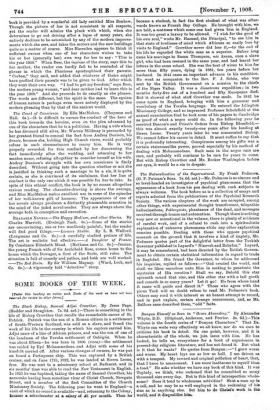SOME BOOKS OF THE WEEK.
[IIeuter this heading we notice such Books of the week as have not been moved for review in other forms.] The Black Bishop, Samuel Adjai Crowther. By Jesse Page. (Hodder and Stoughton. 7s. 6d. net.)—There is something in the life of Bishop Crowther that recalls the remarkable career of St. Patrick. Patrick was the son of a Roman citizen in a settlement of South-Western Scotland, was sold as a slave, and found the work of his life in the country to which his captors carried him. Adjai came of a line of African princes, and was the son of one of the headmen of the Yoruba settlement of Oshbgtin. When he was about fifteen—he was born in 1806 (circa)—the settlement was raided by Ey6 Mohammedans, and Adjai with some of his kinsfolk carried off. After various changes of owners, he was put on board a Portuguese ship. This was captured by a British cruiser, and on June 17th, 1822, he was landed at Sierra Leone, free. He was sent to a missionary school at Bathurst, and in six months' time was able to read the New Testament in English. In 1825 he was baptised, taking the name of Samuel Crowther, his namesake having been sometime vicar of Christ Church, Newgate Street, and a member of the first Committee of the Church Missionary Society. The following year he went to England—a visit of which no record is available—and, returning to the Colony, became a schoolmaster at a salary of Al per month. Then be became a student, in fact the first student of what was after- wards known as Fourah Bay College. He brought with him, we are told, a mattress which some one had given him in England. It was too great a luxury to be allowed. "I wish for the good of his own soul," wrote Mr. Haensel, the Principal, "to see him in that state of lowliness of mind which Africans so easily lose by visits to England." Crowther never did lose it,—to the end of his life he regarded the white man as a superior. Before long came his marriage to Susan Thompson, née Asana, once a slave girl, who had been rescued in the same year, and had learnt her letters in the same school. She was the best of wives to him for more than fifty years, dying in 1881, ten years before her husband. In 1841 came an important advance in his condition. He went as companion to the Rev. F. J. Schou, who was sent by the British Government on a mission to the chiefs of the Niger Valley. It was a disastrous expedition ; in two months forty-five out of a hundred and fifty Europeans died. But it showed of what stuff Crowther was made. In 1842 he came again to England, bringing with him a grammar and vocabulary of the Yoruba language. He entered the Islington Missionary College, and so impressed Professor Scholefield at the annual examination that he took some of his papers to Cambridge as proof of what a negro could do. In the following year he received Deacon's and Priest's Orders from Bishop Blornfield,— this was almost exactly twenty-one years after his landing at Sierra Leone. Twenty years later he was consecrated Bishop. We cannot follow his career in detail. It must suffice to say that it is profoundly interesting. Conspicuous among his gifts was a certain statesmanlike power, proved especially by his method of dealing with Mohammedans. Such men in the negro race are rare, and probably will continue to be rare for years to come. But with Bishop Crowther and Mr. Booker Washington before our eyes, it would be a sin to despair.




























































 Previous page
Previous page